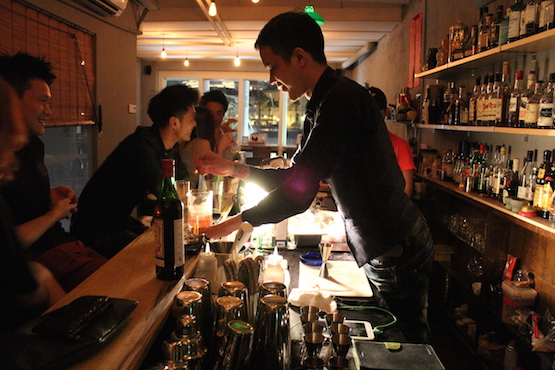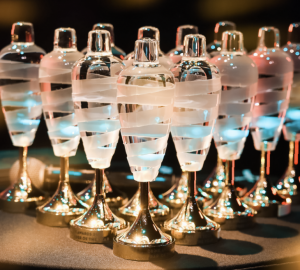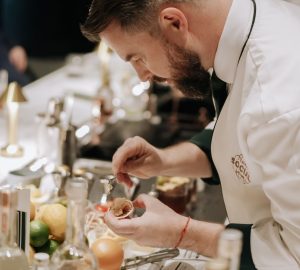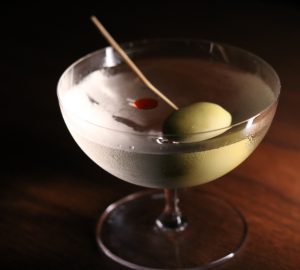Fifteen of the world’s top owner-operators talk survival.
1 Prepare to adapt your concept.
Matt Piacentini is the co-founder of Clyde Common in Portland, Oregon, as well as two bars in New York: The Beagle (now closed) and The Up & Up, his first solo cocktail bar, which opened in February this year. “Clyde Common was such a success from the start that we never had the experience of having ideas not work and need retooling. Because of that I went into The Beagle with an unrealistic attitude that the public was inherently easy to please. I conceived it to run exactly one way for a specific clientele that would act a specific way. When a whole bunch of different people came in, some liked things one way, others a different way, I was unprepared – the concept wasn’t flexible. So with the next bar I built each system to act a certain way, but was prepared for it not to work and had alternatives in place. Flexibility was the guiding factor in everything. I created a seating layout that would work just as well for parties of two as groups of six. I made sure to have a small selection of broad-appeal items for people coming in who may not have experienced serious cocktails.”
2 Establish relationships with the neighbourhood.
Local patronage is vital, continues Piacentini. “Before I opened The Beagle I didn’t research who lived and worked in the area. If I had, I would’ve seen that my opening concept was a bit formal. I learned that pretty quickly when the neighbourhood folk came in to give me their two cents. We adapted. But I lost a lot of potential regulars before I started factoring locals into my plan.”
3 Weekends don’t make a bar.
“Weekends are mostly destination traffic who are looking for the hot new place – they’ll come in once or twice, that’s it. You can’t survive on weekends alone. It’s the locals and regulars that come in on a Tuesday or Sunday that are the core to a bar’s success.”
4 Write a proper business plan.
“It’s absolutely the most important thing,” reckons Piacentini. “So many bartenders think being able to make great drinks is enough to build a successful bar of their own. They think the product is everything. What ends up happening is when the reality of expenses and payroll taxes and insurance starts to set in, the concept starts changing. There’s a huge swing from, ‘It’s all about the product’, to ‘It’s all about making money’. The product goes out the window and ultimately the business fails.”
5 Hospitality. Hospitality. Hospitality.
“Five years ago, a cocktail bar was a place where people would pay to worship at the altar of a bartender’s amazing skills,” continues Piacentini. “We all had this attitude that people wanted to come to our bars and marvel at what we were doing. The idea that we were not the focus of the customer’s experience simply didn’t exist. Now, at the Up & Up, a huge part of the concept has been about creating a bar in the classic sense. Underneath the hand-cut ice and precision measuring, it’s a place where you can get a drink and see a smiling face on the other side of the bar. We’ve done everything we can to take the focus off the bartenders and give it back to the guest. We understand they’re not there to marvel at our art – they come to enjoy themselves.”

6 Plan for hard times.
Most common mistake of start-up bars? “Under capitalisation,” reckons Matthew Bax, bar owner-conceptualist behind one of Australia’s most feted bars Der Raum (now shuttered) and, more recently, Bar Exuberante, a new opening in Melbourne. Don’t just think about start-up capital, he continues. “You need spare cash to keep running your bar at a high standard without cutting corners – the quiet weeks will come no matter who you are.”
7 The space between bartender and bar owner is epic.
“After I opened my first bar, my life, as I knew it, was over,” continues Bax. “I love the freedom of creative control but you are married to the venue 24-7 – it’s very hard to switch off.”
8 Prepare for a huge shift in mind-set.
“It’s about making a move from specialist to generalist,” says Adam Devermann, co-founder of Starling, Shanghai. “Moving from a daily drinks maker to someone who understands, say, COGS (cost of goods sold), how to write a menu, develop a concept, understand employment law, negotiate supplier contracts, forecast profits – that requires a big mental leap. It’s not easy and takes time to learn – but learn it before you open your own venue.”
9 Fun? I remember that.
“Anybody who thinks owning a bar is a fun job shouldn’t do it,” says Abhishek Cherian George, owner of The Spiffy Dapper, one of Singapore’s best cocktail bars. “Especially if you think it’s about spending money and drinking at bars around town/the world. I lived in my bar for a year before it was able to run on its own. If you can’t go all in – don’t go in at all.”
10 Keep it professional.
Biggest misconception about owning a bar? “That we get laid a lot,” replies George. “Doesn’t really happen. Besides, fucking your customers is a stupid thing to do – just like fucking your staff.”
11 Develop an energetic business sense.
“As a bar owner you have to be constantly looking at the bigger picture,” says Logan Brouse, founder of Logan’s Punch, Shanghai. “As a bartender, you’re thinking, OK, it’s Tuesday night, it’s not going to be busy, so I can just hang out and not do too much. As a bar owner, it’s more like, Fuck, it’s a Tuesday night, let’s get some revenue going, let’s do something! As the owner, you have to motivate everybody. If I’m slumped in the corner not paying attention – nobody else will care.”
12 Find a dependable plumber.
“So much of setting up a bar is about water,” continues Brouse. “Not just the sinks, toilets… If we’d known how to properly install our drains my life would’ve been so much easier.” A drain beneath his bar top was installed several months after opening. “I didn’t know to ask for it – I took for granted the designer would take care of it. I would’ve killed to have more technical knowledge before we opened.”
13 The show doesn’t run itself.
“Generally, the people who own the great venues here also work in them,” says Jason Scott, co-founder of The Baxter Inn and Shady Pines Saloon, two of the most highly rated bars in Sydney. “If you build something from scratch, nurture it into life and work there everyday, you want to make sure it’s the best it can be. Guests immediately recognise that kind of dedication. When you first open, as an owner, it’s important to get behind the stick to be immediately aware of customer feedback, get the feel of the staff dynamic and solve any service issues as soon as they arise. Sure, the staff will tell you eventually, but you’ll know the fridge is in the wrong place much sooner if you’re smashing your own knee on it 20 times a night.”

14 Don’t cut corners in construction.
“Toughest part of opening is managing building code compliance,” adds Scott. “Everyone tells you that the build will always take twice as long and cost twice as much as your budget – but it’s still a shock.”
15 The customer is more important than your fancy bar tools – always.
“I wish I’d considered more things from a customer’s perspective before we opened our first bar,” says Paul Mathew, international bar consultant and co-founder of three London bars, The Hide, Demon, Wise & Partners and The Arbitrager. “As a bartender, I wanted to make sure the bar looked great, that the equipment behind the bar was fit for purpose, that drinks could be made efficiently and that we could make the best cocktails possible. What I didn’t do was sit in every seat and imagine I was a customer. Some of our original seats looked great but were uncomfortable. Others were comfortable but you couldn’t see the bar and were difficult for floor staff to reach. We ended up redesigning the floor layout a few times so every guest felt right and the service flow worked better. It doesn’t matter how amazing the drinks are – if people are uncomfortable, nothing else matters.”

16 Don’t jump in too early.
“The reason why we see such a high turnover of bars is the lack of management or business experience,” says Lu Yao, owner-founder of Union Trading Company in Shanghai. “We see a lot of places open by bartenders who’ve managed to attract capital because they won a competition or got some publicity. But they forget: being a good bartender has nothing to do with being a leader and a good bar owner. Bars tank because of a lack of vision and leadership. Combine that with poor decision making, lack of attention to cost and detail, and the bar’s going under.”
17 The concept should be original….
“A lot of bars fail because they don’t have a clear identity,” adds Lu. “Folks in big cities are spoiled by choice. Every bar needs a clear concept so they can find their own niche markets and ultimately differentiate themselves from the hundreds of other bars in town.”
18 ….but also well timed.
Co-founder of popular Singapore drinkery Ah Sam Cold Drinks Stall, Sam Wong reckons understanding the maturity of your market is key. “Even when we started two years back the craft cocktail scene in Singapore was already heating up and it was necessary to find a niche to stand out. Still, we knew from experience that we shouldn’t go all out just to be different – you can’t jump too far ahead of the curve. Finding that balance took a lot of discussion before we opened.”

19 Rising tide lifts all boats.
Singapore’s development as a cocktail city is partly due to a co-operative ethos between bars, says Wong. “Even though the scene is very competitive, we’re a very compact, close-knit community. That’s the beauty of the scene in Singapore: whether you’re working at a posh venue or an old shophouse, the “kampong” [“community”] spirit still prevails; everyone helps each other.”
20 A bar is a business. Not a showroom for your own ego.
What kind of bartenders make the worst bar owners? “The ones that open bars for other bartenders,” replies Morgan Schick, bar manager of award-winning San Francisco bar Trick Dog and creative director of bar consultancy Bon Vivants. “A crucial thing in running a bar is to understand that you are serving your guests. If you only serve drinks that you like, only play the tunes you like, only stock the beers you like, then you will have an audience of two: you, and your mum (and she has to like it). This attitude extends to accepting the styles of your employees as well. Everyone has a different route to the same goal – running a bar means letting the staff follow their route and just ensuring the goal is right.”
21 Let your bartenders be themselves.
Co-owner of Shanghai cocktail bar Epic, Cross Yu agrees. “As an owner, get to know your staff and understand their different characters. I encourage my bartenders to be individual – I don’t want them all to have the same style. I don’t tell them how to be. I let them find their own way to balance their personality with their job responsibilities.”
22 Invest in your team.
“One of the most common mistakes new bar operators make is insufficient bar training,” says Stephan Hinz, one of Germany’s top bartenders and owner of Little Link, a new bar in Cologne. “It’s not just about the bar owner – it’s about a team. The best bar owner in the world will fail without the backing of experienced, properly in-the-know bartenders.”
23 Take your time hiring a bar manager.
“In my experience, the relationship between owner and manager is the most important thing,” reckons Dushan Zaric, founder of Employees Only, one of the most successful cocktail bars in New York. “If the bar owner is not hospitable to their staff then they have no right to expect that their staff will, in turn, be hospitable to their guests. As the saying goes, ‘The fish stinks from the head down’.”
24 Offer experiences, not cocktails.
“You have to make your bar different,” adds Zaric, whose bar became famous for its thank-you chicken broth, served to all guests who stay until 4am. “The only way that can happen and lead to a sustainable business is if you include a human element. So, ask yourself, Do your guests feel welcome? Do they feel like they belong? Do they want to stay? Will they come tomorrow? Will they tell their friends? These are the questions that need to be on your mind. The quality of the drink is not something you can base a business plan on. These days, everyone has Japanese tools, everyone has ice blocks. The question is, ‘What emotional experience is the guest getting at your bar?’”
25 Don’t half-ass your idea.
Rum collector Martin Cate is one of San Francisco’s most prolific bar owners and the founder of Smuggler’s Cove, considered one of best tiki bars in the US. On the challenges of developing a single-category bar: “The important thing is to fully commit to your concept. You need to invite guests into your vision and make them feel welcome. You’re hoping to get them invested in the idea so they’ll participate. They won’t know all the details but they’ll know if the idea isn’t fully realised. When our guests arrive they are presented with a menu that announces what we do and why we do it. By limiting their selection of other spirits they get a sense that their best experience probably lies with a rum drink. And it works: 93 per cent of our sales are rum cocktails or neat rum serves.”

26 Owning a bar won’t make you rich.
“Don’t expect to make tons of money,” says Jamie Boudreau, owner-operator of Canon, the Seattle bar with the largest American whiskey collection in the world. “The reality is you’ll make less money than you would as a bartender if you break down the hours. But it’s worth it. The best part about owning a bar is knowing that the successes and failures are all yours. Yes, a lot of the things that you loved about the industry will disappear. But you’ll be rewarded by putting your creation out there and seeing happy patrons return day after day.”
27 Don’t let anything put you off.
Almost all the interviewees for this article said, despite the pitfalls, owning-running a bar is a profoundly nourishing life experience. Perhaps Lu Yao says it best: “The feeling of being able to provide guest experiences in a way we believe in, to get the love and support from our guests, it’s absolutely exhilarating. The most humbling experience I’ve ever had.”








